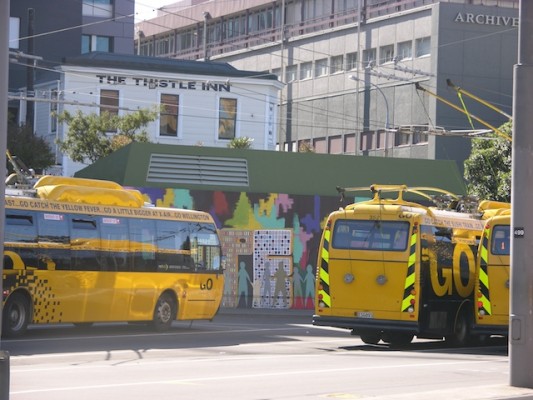Call For Road Pricing
in Featured Motorways Top Debate by AKT — April 28, 2011 at 5:37 pm | 7 comments
The Wellington Employers’ Chamber of Commerce wants the government to introduce road pricing as a way of managing transport in New Zealand.
Chamber CEO Ken Harris. says that given the current funding constraints, now is the time to seriously consider road pricing options.
“Charging vehicles according to use of roads and time of day would make passenger transport more economic relative to car travel without resorting to the need for expensive public transport subsidies. It would be a fairer and more rational approach to supporting public transport.
“This is something that works well in other countries and the technology is available for New Zealand.”
![wellington]()
Wellington call for road pricing
The chamber is also calling for “more balance” in the road versus public transport debate.
“The Wellington business community is a strong advocate of the government’s road investment program but there is no reason why we can’t have improved public transport as well. It is disappointing the debate has become polarised as road versus public transport. Roading investment can go hand in hand with improved passenger transport and other transport modes.
“As well as being a strong advocate of the proposed roading investment, the Chamber believes in a well developed public transport system for the Wellington region.
“Public transport provides an important alternative to private cars and plays an essential role in reducing congestion. The more people use public transport, the more road space is freed up for people who need to use motor vehicles.
“In Wellington we favour a balanced approach to the transport system to address the city’s unique transport challenges - although at this stage we doubt light rail is the way to go given its expense and inflexibility.
Tags: road pricing Wellington












7 Comments
Exactly. So obvious, so why is it so strange to hear that from that source? Weird outbreak of reason.
They are correct, we need balance as no one mode can solve all problems yet we are still designing the majority of our transport system for one mode. Transport spending in this country has become a little bit like a fat kid sitting on one side of see-saw, occasionally the skinny kid on the other end jumps hard enough to get the other side to move slightly but it quickly returns to the same position.
I’m all for balanced transport policy. But by that I mean NZTA should spend 50% of their money on PT.
I wonder if that’s what the Wellington Chamber of Commerce has in mind as balanced?
Yes, heaven forbid that the wise men of the ChamCom should have to share the road with those grubby poor people….so lets make it unaffordable for them to drive…
Variable real time road pricing is the ultimate tool to increase the productivity of our existing road network.
For it to be successfully a few major barriers must be overcome.
- Collection and system operation costs must be relatively low.
- Common decision that it is more efficient to use money rather than time to allocate our scarce road-space resource
- Communicate benefits to both interest groups (being those who chose not or to continue driving:
-Common benefit: more productive roadway (and economy) as a free flow road moves more vehicles than a congested one.
-Common benefit: Increased tax revenue
-Benefit for those than now choose not to drive. Get to free ride on the tax of those that choose to drive, less contested roads for buses and emergency vehicles
-Benefit for those who choose to drive: Time saving benefit.
In reality I doubt we can achieve the above in the next decade. I think those who stop driving at peak times will resent the rich people who can afford to, and that the people who do drive will resent paying, forgetting the time saving benefit of the policy.
I like the idea of a real time variable tolled motorway fast lane through busy sections. I have a plan in my head where a combination of screens, cameras and soft lane barriers would be used to vary and collect tolls to ensure minimum cost to allow free-flow of this lane.
millsy, Wellington mostly has viable peak-time transport alternatives for “those grubby poor people” to use. It’s not an unreasonable position, especially if the money raised goes into improving services further.
In Auckland’s case, some parts of the region (outer areas, south-east, south-west) are so poorly served by public transport that there is little option for residents.
If everything was evenly balanced out this would lead to a fantstic result, only the idiots in the government and the editors in the dominion will never see that.